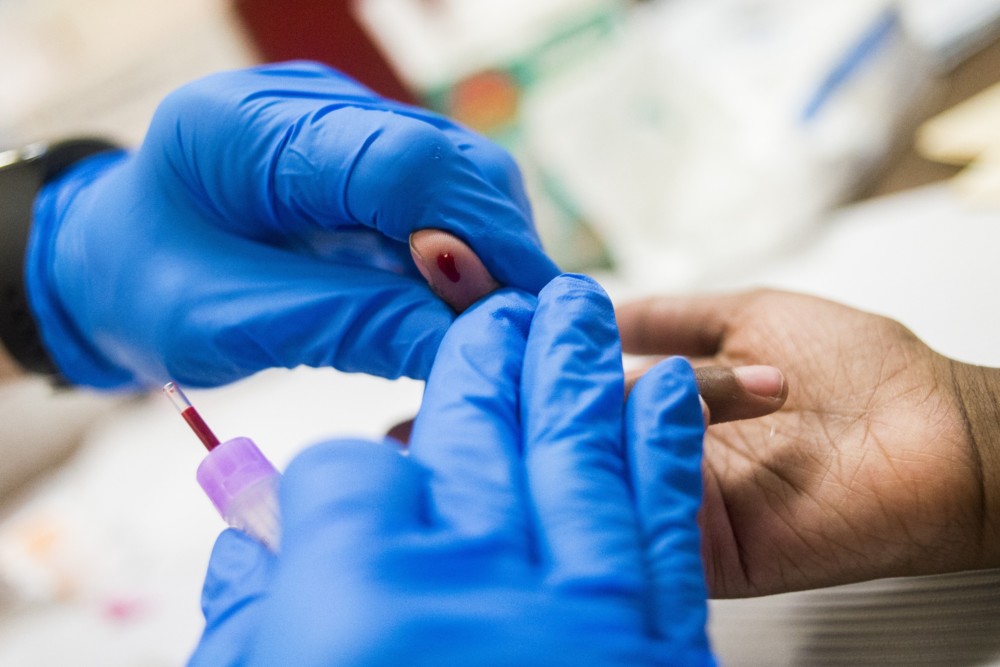By Bradley J. Fikes
The San Diego Union-Tribune
WWR Article Summary (tl;dr) With microchip technology, patients could take single-use tests and get immediate results. So instead of patients having to give blood and wait to hear later from the lab, they would know their results immediately.
The San Diego Union-Tribune
In an instrument-packed garage in Carlsbad, Octavian and Ana Florescu are working to apply the power of microchips to quickly and cheaply run common analytical tests on blood.
The company they founded, In Diagnostics, has raised $3 million to get that technology to market. It has developed a prototype, to be first introduced for veterinary tests. Later, the chip will be refined for human use.
Instead of patients having to give blood and get results later from a lab, patients can take single-use tests with readouts while patients wait. For example, a pharmacy can run a test to determine if a patient is likely to respond well to a drug.
The retail cost could be about $25, the company estimates. Since these are single-use tests in one integrated device, no instrument readers are needed. The amount of blood needed can be taken from a finger stick.
The analytical chips can be made cheaply by repurposing older chip technology for life science applications, says Octavian Florescu. He designed chips for Qualcomm in the early 2000s, and got his Ph.D. from UC Berkeley developing bio-microchips.
“I took Qualcomm’s philosophy of integrating more and more components onto the same chip, but applied it for detecting molecules,” he said. “The goal is to make a microchip that can detect molecules without any kind of external components or user intervention.”
Chip-making factories, or “fabs” are notoriously expensive, he said. But the older ones have been amortized, and as a result their chips are “dirt cheap.”
“If you go to your dollar store, you can find electronics for $1 that you throw away, with a screen, a battery and a little processor to run everything.”
However, the promise of cheap, accurate blood tests from a few drops of blood has been explored before, in the notorious company Theranos. Other blood testing companies have had to deal with skepticism as a result.
Theranos promised revolutionary technology, but never delivered. Founder Elizabeth Holmes and former business partner Ramesh “Sunny” Balwani are scheduled to go to trial next year on federal wire fraud charges. They have pleaded not guilty.
Octavian Florescu says In Diagnostics differs from Theranos in that it’s not promising a mysterious new technology. The company takes advantage of old technology applied in new ways.
And the blood tests themselves are standard, measuring chemicals involved with kidney function, for example.
“You are using standard technology or standard processes to measure standard analytes,” he said. “You just do it in a smaller form.”
All that’s needed for approval is to demonstrate that the chips perform these standard tests with the same accuracy as existing equipment, he said.
Entrepreneurial focus
Ana Florescu, Octavian’s wife, adds entrepreneurial skills in funding science. She developed those at Maastricht University in the Netherlands.
“Their scientists made great discoveries and were looking for ways to commercialize all of that science,” she said. “We launched an incubator, with government funding. We used the ‘triple helix’ model of innovation, focused on collaboration between academia, industry and the government to foster regional economic and social development.”
That skill set landed her a job with an incubator in Palo Alto, where she met Octavian. Coincidentally, both are from the city of Brasov, in Romania, but never met there.
The Florescus got In Diagnostics off the ground in March of last year, just after they moved from the Bay Area to Carlsbad. The Series A funding for In Diagnostics closed Aug. 1.
The Bay Area was simply too expensive for many life science startups, Octavian Florescu said.
“Prices were going through the roof,” he said. “Prices were crazy on everything — on labor, on commercial real estate, on houses. We figured we should come down here because there’s a pool of both (integrated circuit) designers and biotech scientists that we could rely on.”
They chose Carlsbad with the help of biotech entrepreneur Joseph Jackson, Ana Florescu said. They knew Jackson from BioCurious, a Silicon Valley community life science lab.
Jackson had moved to Carlsbad several years ago, where he helped establish Bio, Tech and Beyond, another community life science incubator. That attracted their interest, she said.
buy kamagra soft generic buy kamagra soft online no prescription
Bio, Tech and Beyond offers both space and shared use of equipment, which helps startups like In Diagnostics keep expenses down. The company has rented use of a lab bench at the incubator, which provides access to additional equipment not in the Florescus’ home office.
And Jackson himself, along with the incubator, proved valuable in helping the company integrate into the community.
“For us, it was obvious that we wanted to go work there,” she said. “He knows so many people. It’s not only the space, it’s also his connections. For everything you need, he has the guy.”
Crowded market
With its new funding, In Diagnostics is beginning to expand, Ana Florescu said. The company is signing a lease for a 5,300 square foot space near McClellan — Palomar Airport. It’s looking to hire five to 10 people in the next year to commercialize the prototype.
Jackson said he’s recently seen a number of husband-and-wife startups like In Diagnostics.
The diagnostics market is crowded and competitive, Jackson said, recounting the advice he gave the company.
“A lot of this comes down not so much as your technology, but your reimbursement strategy, and other strategic partnerships to be able to actually get your test adopted in the market,” Jackson said.
In Diagnostics can be reached at www.indiagnostics.com.
___
Distributed by Tribune Content Agency, LLC.














































































































































































































































































































































































